
Surat Pekeliling KPPK Bil 1/2019 Panduan Sistem Pensijilan Kemahiran Malaysia (SPKM) Berasaskan Kredit – kemaskini 29 Oktober 2019

Panduan Pelaksanaan Sistem Pensijilan Kemahiran Malaysia (SPKM) Berasaskan Kredit – kemaskini 4 November 2019

Surat Pekeliling KPPK Bil 1/2019 Panduan Sistem Pensijilan Kemahiran Malaysia (SPKM) Berasaskan Kredit – kemaskini 29 Oktober 2019

Panduan Pelaksanaan Sistem Pensijilan Kemahiran Malaysia (SPKM) Berasaskan Kredit – kemaskini 4 November 2019
School leavers with the ambition of becoming professional drone pilots can soon take a course on Drone Piloting under a vocational programme at colleges and polytechnics around the country.
The Department of Skills Development under the Ministry of Human Resources recently launched the Malaysia National Occupational Skills Standards (NOSS) for the piloting of Remotely Operated Vehicle (ROV) or Unmanned Aerial Vehicle (UAV), popularly referred to as ‘Drones’’.
With the launch of this standard, vocational and private educational institutions can now offer Drone Piloting courses under the Technical and Vocational Education and Training (TVET) programme and be awarded the SKM (Sijil Kemahiran Malaysia) or a Malaysia Skills Certificate.
At the moment, several private organisations have been offering courses in various aspects of drone operation; for mapping, facilities inspection, progress report (for property developers and construction projects), film and drama production, news, the acquisition of aerial footage and photographs.
These courses last from two days (for basic operation of a drone) to a few days covering the various aspects of drone piloting for specific purposes such as mapping.
Before the launch of the NOSS Standard, formal government-recognised certification for drone piloting courses were not available for the aspiring pilot.
As the usage of drones expands, beyond a hobby to industrial use, the need for trained pilots who have gone through structured instructions based on an accepted and recognised national standards, become increasingly pressing.
Especially now that the word ‘drone’ appears in the media daily from all over the world; both negative and positive news.
But it is always the negative aspects that capture the public’s imagination and it is up to the industry to dispel negativity and myths that surround drones.
One positive effort is the adoption of formalised training for drone operators; people who not only know how to operate them safely within the limitations of each type of craft but who are also aware of the legal and regulatory requirements in the operation of drones.
Sometime in 2017, Malaysia Unmanned Drones Activist Society (MUDAS), a non-governmental organisation devoted to the development and advancement of drones in the country, initiated discussions with the Department of Skills Development or Jabatan Pembangunan Kemahiran (JPK) to develop a formal curriculum for the training of drone pilots under the vocational programmes of the many polytechnics and colleges spread throughout the country.
MUDAS is a non-governmental organisation devoted to the development and advancement of drones in the country.
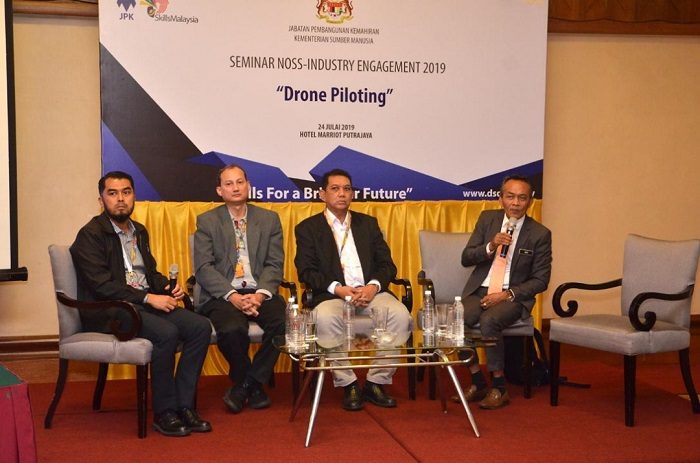
The NGO has been in the forefront of promoting dialogue with government agencies that are involved in regulating and controlling the nation’s airspace, the Civil Aviation Authority of Malaysia (CAAM), the Jabatan Ukur dan Pemetaan Negara (JUPEM), the survey and mapping department, which has traditionally been the authority overseeing aerial photography, especially mapping because of its implications on national security, and other organisations that have direct and indirect interests in the operation of ‘drones’.
“MUDAS initiated contact with JPK in late 2017 to moot the idea of drone pilot training under the National Occupational Skills Standard (NOSS) programme,” said Executive Secretary William Alvisse.
“In mid-2018 an expert panel was formed comprising of representatives from CAAM, Jupem and MCMC (Malaysian Communications and Multimedia Commission) to create the current Curriculum,” Alvisse added.
Husni Faiz, a graduate of Electrical Power Engineering and a full-time pilot under BIP Studio and drone piloting trainer welcomes the NOSS Standards.
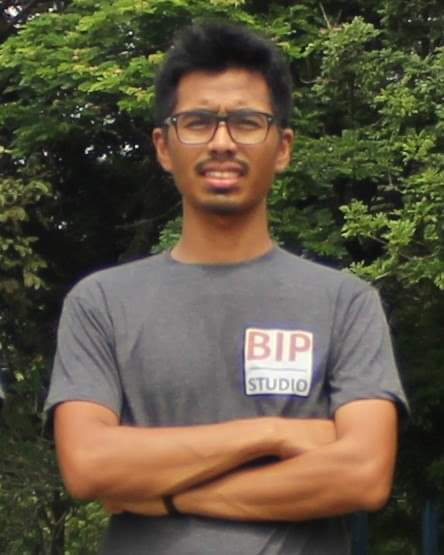
“It’s vital for those intending to be professional drone pilots undergo formal training such as the structure that is recommended in the NOSS standard.
“While recreational flyers may not need the entire course structure, it would be a good idea if parts or modules of that could be offered to training companies to train the hobbyists and recreational flyers,” he added.
Husni also trains pilots under his Akufly Academy.
“Having the NOSS training standard is good for the industry, said Kamarul A Muhamed, CEO of the Aerodyne Group.
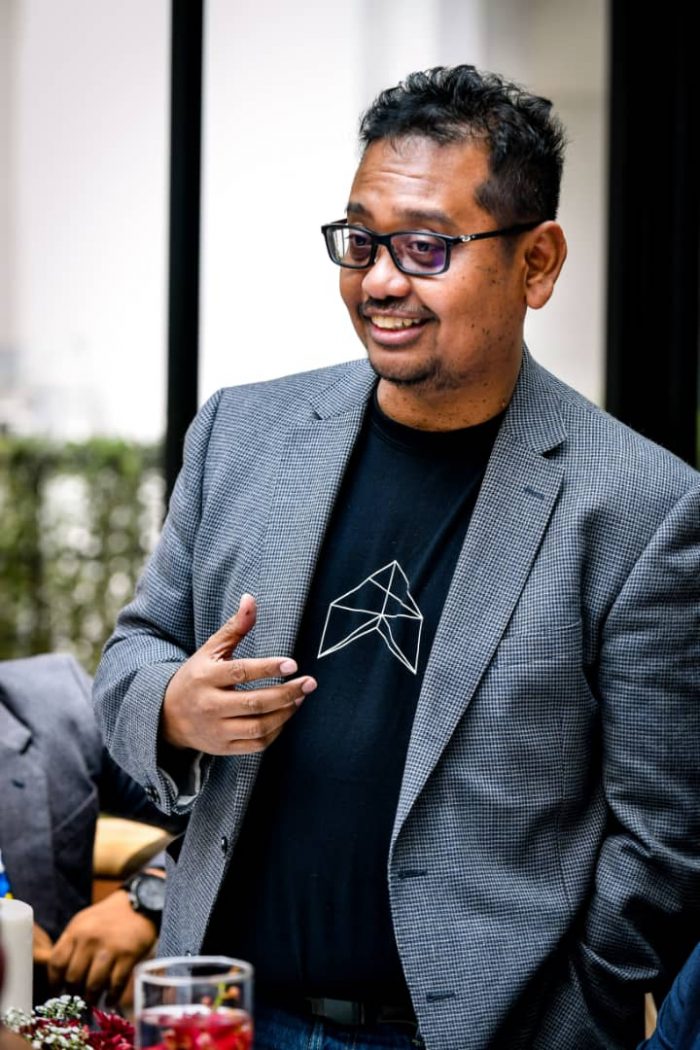
Aerodyne operates in 11 countries and is regarded as the premier drone services company, providing integrated managed solutions for the petroleum, civil engineering and facilities industry.
It employs 300 people, 1/3rd of whom are drone pilots.
“A structured drone piloting course will increase the level of competence and will lead to better safety and quality of operations,” he added.
Currently, Aerodyne trains its local pilots locally and in-house following the structure set by training schools in the UK and Australia where some of their pilots and trainers have been trained. The company then structure their training based on the training syllabus of these schools.
The Aerodyne pilots operating in their international markets are trained at authorised training schools for certifications should this be available in that particular country.
As a renowned global drone services company, recruitment isn’t an issue with many would-be pilots clamouring to join the group.
“The challenge, however, is in getting good technical pilots with the right mentality for enterprise-level work,” Kamarul said.
Kamarul lists technical ability, having a global mindset, the ability to communicate well and good and diligent in report writing, and problem-solving skills as the key factors he looks for in a candidate.
Drone Academy Asia provides training for drone operators and its graduates receive a “globally recognised DJI certificate”.
A representative of the academy said that they believe a formalised course structure is needed for the industry and that they are studying the NOSS standard and framework.
Located at the Cyberjaya Innovation Hub, Drone Academy offers courses in Aerial Mapping and Surveying, Precise Aerial Mapping and a Human Resource Development Fund (HRDF) claimable Professional Drone Operator course.
The idea for a structured course, leading to certification is to produce well trained and competent workforce to meet the requirements of drone service companies to handle flights for mapping, facilities and structure monitoring, agriculture to name just three areas where drones are being increasingly used.
“There are two levels, Level 2 and 3 with 1,200 hours and 1,300 hours of training respectively,” said Alvisse.
“Upon completion of the training, candidates will be awarded an SKM (Sijil Kemahiran Malaysia) certificate,” Alvisse added.
“Just a word of caution though,” Kamarul said.
“In the long term drone piloting will be limited in requirements as the industry moves into pilotless autonomous operation.”
Which will then necessitate an overhaul of the training syllabus?
Source: Citizen Journalist Malaysia
Daftar NOSS Jan 2019
NOSS terbaru di bawah cuma sebahagian daripada puluhan NOSS yang baru diluluskan oleh bahagian NOSS, Jabatan Pembangunan Kemahiran (JPK)
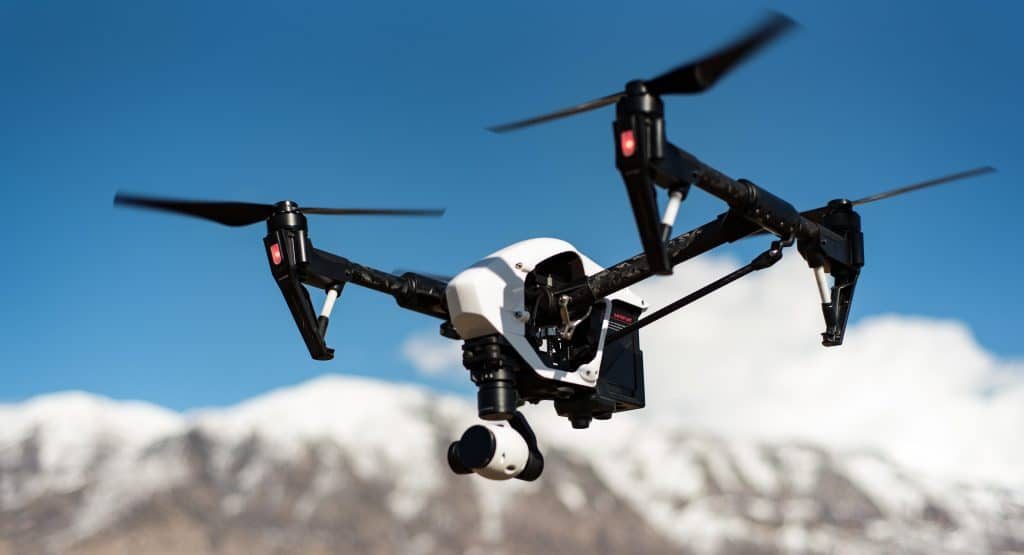
Perkembangan terkini: Setakat Feb 2020, cuma sebuah Pusat Bertauliah JPK swasta, SG Akademi yang telah ditauliahkan untuk program ini.
Ambil perhatian bahawa banyak pusat latihan yang menawarkan kursus drone piloting/mission handling, namun mereka tidak mengguna pakai Standard Kemahiran Pekerjaan Kebangsaan yang telah dibangunkan bersama oleh Jabatan Pembangunan Kemahiran, JPK dan CAAM (Civil Aviation Authority Malaysia)
Peluang pekerjaan dalam industri teknologi drone merentasi pelbagai industri sedang melonjak dari peringkat asas ke peringkat mega-trend dengan cepat kerana semakin banyak industri telah mula menyedari potensi, skop, dan skala capaian global melalui penggunaan teknologi drone.
*Biasiswa (tajaan SG Akademi) diberikan kepada 20 pelajar perintis pertama! Jaminan pekerjaan!

Pihak Jabatan Pembangunan Kemahiran, JPK juga memberi perhatian kepada bidang muzik agar bidang itu turut mendapat pengiktirafan dari dalam dan luar negeri.
Usaha membangunkan Standard Kemahiran Pekerjaan Kebangsaan (NOSS) bagi bidang muzik adalah untuk membolehkan kerjaya berkenaan dinilai secara profesional oleh pelbagai pihak.
Pembangunan NOSS ini sangat penting memandangkan muzik antara bidang pendidikan yang semakin mendapat sambutan daripada semua peringkat umur,” katanya ketika berucap pada Majlis Pelancaran NOSS bagi Industri Pendidikan Muzik di Akademi Seni Budaya dan Warisan Kebangsaan (ASWARA)
Timbalan Ketua Pengarah Jabatan Pembangunan Kemahiran, Suimi Abd Majid
Pelaksanaan NOSS bagi industri muzik menyasarkan tenaga pengajar dalam bidang berkenaan agar memperoleh sijil yang boleh digunakan sebagai kelayakan dalam bidang kerjaya berkenaan.
Kita tahu semua tenaga pengajar bidang muzik sememangnya sudah mahir dan pakar, tetapi tidak semua daripada mereka mempunyai sijil yang mengiktiraf kemahiran yang dimiliki itu.
Timbalan Ketua Pengarah Jabatan Pembangunan Kemahiran, Suimi Abd Majid
Mereka hanya perlu mengikuti kursus jangka pendek di pusat latihan berdaftar dan bakal memperoleh sijil pengiktirafan yang membuktikan kemahiran mereka.Sijil itu bukan sahaja diperakui oleh pihak industri di negara ini tetapi juga di peringkat antarabangsa.
Jika anda nak beli NOSS, boleh beli di JPK Putrajaya/Cyberjaya/Pejabat-pejabat Wilayah ataupun kalau kami ada, boleh juga order dari kami untuk RM20 setiap pakej (SKM1/2/3 – 1 pakej, DKM/DLKM – 1 pakej)
Nota: Mulai 1/6/19, NOSS dijual pada RM20 setiap tahap
NOTE: Effective 1/6/19, NOSS would be sold at RM20/Level (USD20/Level for foreign buyer).

Warga kerja Air Selangor menzahirkan kegembiraan setelah menerima sijil SKM-PPT masing-masing.
LOJI Rawatan Air Sungai Semenyih mendapat pengiktirafan sebagai Pusat Bertauliah Sistem Latihan Dual Nasional (SLDN) daripada Jabatan Pembangunan Kemahiran (JPK), Kementerian Sumber Manusia.
Dengan pengiktirafan ini Pengurusan Air Selangor Sdn Bhd (Air Selangor) selaku operator air yang terbesar di negara ini akan dapat mengendalikan latihan kemahiran melalui pusat bertauliahnya sendiri bagi melahirkan tenaga kerja yang kompeten dan berkualiti di dalam industri pembekalan air, termasuk memberikan latihan kepada operator-operator air lain di negara ini.
Latihan kemahiran yang akan dilaksanakan adalah berdasarkan Piawaian Kemahiran Pekerjaan Kebangsaan atau National Occupational Skills Standard (NOSS). Pengiktirafan ini diterima pada Oktober 2018.
Ketua Pegawai Eksekutif Air Selangor, Suhaimi Kamaralzaman menerima sijil pengiktirafan daripada Jabatan Pembangunan Kemahiran, dalam Majlis Penganugerahan Sijil Kemahiran Malaysia bagi Pengiktirafan Pencapaian Terdahulu (SKM-PPT) baru-baru ini.

Seramai 346 warga kerja Air Selangor yang berkhidmat di Jabatan Operasi, Pengagihan dan Perhubungan Pelanggan juga menerima sijil SKM-PPT masing-masing di majlis tersebut.
Pengiktirafan ini adalah di antara usaha berterusan Air Selangor dalam membentuk warga kerja yang berkemahiran serta kompeten untuk memberikan khidmat yang terbaik kepada syarikat dan juga pelanggan.
Air Selangor amat komited dalam memenuhi keperluan kompetensi di dalam industri perkhidmatan air di negara ini dengan menjadikan kompetensi sebahagian daripada parameter Petunjuk Prestasi Utama (KPI) syarikat.
“Ini sejajar dengan ketetapan Suruhanjaya Perkhidmatan Air Negara (SPAN) yang menetapkan kompetensi sebagai syarat untuk memperbaharui lesen syarikat perkhidmatan industri air di Malaysia, tambah beliau.
Kumpulan penerima sijil terbaharu ini adalah sebahagian daripada 481 warga kerja Air Selangor yang telah mendapat pengiktirafan ini setakat kini.
Dalam perancangan bagi tahun hadapan, Air Selangor mensasarkan sebanyak 50 peratus warga kerja Jabatan Pengeluaran dan 30 peratus lagi warga kerja Jabatan Pengagihan untuk menjalani program ini.
Menjelang penghujung 2019, dianggarkan sebanyak lebih 600 warga kerja Air Selangor berjaya mendapatkan pensijilan yang bakal membantu mereka melaksanakan kerja dengan lebih efektif.
Pengiktirafan dengan pensijilan ini juga merupakan antara pelan kerjaya strategik Air Selangor dalam membangunkan warga kerjanya bagi mencapai misi syarikat untuk menyampaikan pengalaman yang terbaik kepada pelanggan.
Sumber: www.mstar.com.my/
The private education sector has been supplementing and complementing the government in providing education for more than 80 years, since 1936. Based on current data, more than 51 per cent of post-secondary education is provided by private higher education institutions, saving the government billions of ringgit in expenditure in education. In addition, private education contributes to the economy of the country in the range of RM50 billion, of which close to RM17 billion is derived from enrollment revenue of international students. And not forgetting that all our graduates are gainfully employed and sought after by industry
However, the private education sector is becoming a sunset industry as many institutions are facing massive losses due to reduced student enrollment with some in the process of closure.
How has this come about? Past statistics showed that close to 25 per cent percent of school leavers each year do not enroll in any form of education or training. A majority of them belong to the B40 group (the group where annual household income is below RM40,000). Presently the percentage has increased from 25 per cent to more than 40 per cent. This is due to the requirement of a pass in Sejarah at SPM level. This has prevented and penalised students who have passed in other subjects including mathematics and science but failed in Sejarah. This has made a large number of SPM students ineligible to enroll for further post-secondary programmes like Pre University (Foundation, Matriculation, A-Level) as well as diploma programmes, and critically affected the enrollment of SPM school leavers in private educational institutions.
When the global focus is on science and technology and Industry 4.0, we are depriving our school leavers of the opportunity to continue on to post-secondary education and training and losing much needed talent in the workforce. NAPEI proposes that the requirement of a pass in Sejarah be reviewed. If not addressed, we believe this will also cause socioeconomic problems among the youth in the country.
In addition to the above, retarding policies and regulations set by overzealous bureaucrats related to administration and operations have further caused barriers to the progress of private education.
The enrollment of international students has dropped by about 32 per cent in 2018 due to policies and regulations that deter international students from choosing Malaysia as a study destination. Countries like Japan and Canada, which are already study destinations of choice by students, have made changes to their immigration policies and regulations in order to attract more international students. One of the more effective policies for Malaysia to attract more international students is to allow up to 20 hours a week of part time employment while studying. Another factor causing a decrease in recruitment of international students is the revocation of KDN’s licence to recruit international students. And in many cases, the KDN licences were revoked for reasons beyond the control of the institutions.
We will not be able to reach the target of 200,000 international students by 2020 and 250,000 students by 2025 if we are not serious in reviewing the existing policies and regulations.
With reference to Amanat 2019, the public education system will enjoy greater autonomy under the new proposal, but the private education sector is given less autonomy through retarding policies and over regulation of the Ministry, thus making it difficult for it to grow further. The private education industry wishes to work closely with the Ministry of Education to continue providing quality education. NAPEI suggests an impact analysis be done before any policy or regulation is rolled out, as per MPC guidelines. We are looking for more engagement with the Ministry of Education in further enhancing the human capital development of the country and to be an integral part of the new agenda outlined in Amanat 2019.
We hope related agencies and ministries like EPU, Miti and the Ministry of Finance too could be engaged to look at the bigger picture in terms of economic development of the nation and contribution to the GDP by the revenue derived from the international student market.
Source: https://www.malaymail.com
Students of Politeknik Ungku Omar get hands on training on automotive engineering at the workshop at their campus in Ipoh.
A framework has been proposed to address the long-standing problems of our TVET system
A NEW framework for technical and vocational training is in the pipelines.
Proposed by the National TVET Movement to the Economic Planning Unit last month, the framework aims to address the country’s ailing TVET system.
“Our focus is on upper secondary school students. We want to create a TVET champion.
“We want students to have better access to choices between academics and something more hands-on like TVET. This is what’s happening in other countries,” said Ahmad Tajudin, who recently retired as the Education Ministry deputy director-general.
Among those part of the Movement are the Federation of Human Resources Ministry’s Department of Skills Development (JPK) Accredited Centres (FeMac), National Council of Professors, and the National Parent-Teacher Associations’ Vocational and Technical Consultative Council.
For too long, TVET has been the “troubled stepchild” of the education system, he said.
This framework tackles long-standing problems like the:
> Overlapping of programmes and certifications;
> Misguided focus on post-secondary TVET students instead of upper secondary students;
> Existence of multiple accreditation bodies and agencies implementing TVET;
> High operations cost resulting from the many ministries involved;
> Weak policies; and
> Private TVET providers being treated as competitors.
“All TVET institutions should be streamlined, rationalised, and consolidated, under the Education Ministry.
“This ensures that teachers and trainers are better taken care of under one scheme of service. And, there won’t be a need to close down any institutions if all facilities and resources are under one roof,” he said, adding that it would also be more cost effective for the Government while ensuring smoother communication between the industry and institutions.
Other reforms proposed by the Movement include:
> Reducing existing certifications to an important few;
> Having a single accreditation body for TVET;
> Establishing two educational pathways for students to choose from;
> Allowing industries to take the lead;
> Enhancing TVET apprenticeship programmes based on models from other developed countries; and
> Formulating policies and legislations to enhance careers in TVET.
Greater emphasis, and an overview, of TVET implementation is needed, Ahmad Tajudin said.
There should be training provisions to facilitate contributions from private TVET providers, and there must be closer collaboration between the industry and these providers.
“Our TVET system needs stronger institutional coordination, and greater transparency among the multiple public agencies.
“TVET restructuring is a small part of a holistic solution, but it’s a start to the reform,” he said, adding that strong political will from the Government was crucial to ensure the country’s TVET success.
Education Minister Dr Maszlee Malik said the Government would continue enhancing the capabilities of TVET institutions and systems to remain competitive and meet industry demands.
Speaking during his annual new year address in Serdang on Monday, he said the ministry would implement a harmonised accreditation and quality assurance system to enable student mobility in TVET institutions, which includes the Malaysian Technical University Network (MTUN).
MTUN, he said, should move in the direction of Fachhochschule – Germany’s tertiary education institution specialising in topical areas.
MTUN, he added, shouldn’t be evaluated solely based on publications, but also on the ability of the graduates produced to solve technical issues.
He said the ministry plans to increase the quality and delivery of TVET by enabling the industry to lead the curriculum development, avoid overlapping of programmes and resources, improve cost effectiveness, and widen the funding to increase enrolment.
He said the ministry was also in the midst of addressing recognition issues involving controversial vocational colleges.
He assured polytechnics and community colleges that they wouldn’t be sidelined in the reform process.
“To ensure the employability of our graduates, closer collaboration between these institutions and the industry – especially with the big players – will be prioritised,” he said, adding that these were part of the ministry’s efforts in making sure that TVET, polytechnics, vocational colleges, and community colleges, are no longer seen as second choice options.
In June last year, Dr Maszlee appointed Lembah Pantai MP Nurul Izzah Anwar to chair a special TVET task force.
The duties of the task force, said Dr Maszlee, was to conduct research across all ministries that provide TVET education and training, and recommend how the country’s TVET system can be improved. This includes a review of TVET education and training laws, and the possibility of a TVET commission.
However, the TVET industry was left reeling following Nurul Izzah’s resignation as PKR vice president on Dec 17, and her decision to no longer serve the federal government in any capacity.
“We’ll continue advocating for a sustainable and effective TVET implementation,” said Ahmad Tajudin.
Source: www.thestar.com.my
Comment: It’s good that the Ministry has identified the weaknesses & looking to implement the reforms (personally, I see that our TVET sector would soar to much greater heights compared to now, if reforms are implemented effectively & correctly).
But I have a doubt whether they would reform this particular weakness – Private TVET providers being treated as competitors.
It seems that there are plans to gradually “KILL” the private TVET providers based on their proposed plans (hearsay, so take it with a pinch of salt).
These include but not limited to:
1) Closing all TVET providers that are 2 stars and below after the impending 2019 star rating process (as early as March 2019). It generally affects the smaller private TVET providers who has very limited resources (manpower & finances) vs the public TVET institutions.
2) Closing/revoke Vocational Training Operation (VTO) programme of any private TVET institutions that has does not meet a min of 4 stars and above for that particular programme. Eventually, it would be just offered by the multiple satellite campuses of CIAST, nationwide,
3) Restrict the organising of the JPK’s various induction courses (PP-PPD-PPB, PP-PPT, PPL) to only CIAST satellite campuses, nationwide.
4) and BEYOND – perhaps you can comment if you think what they are doing/planning to do is gonna KILL the private TVET providers.
Pemansuhan Kelulusan Pentauliahan Program Secara Bersyarat ini bermaksud;
Pusat Bertauliah yang bakal ditauliahkan oleh Jabatan Pembangunan Kemahiran (JPK) perlu memenuhi semua syarat pentauliahan sebelum kelulusan program/pusat diberi.
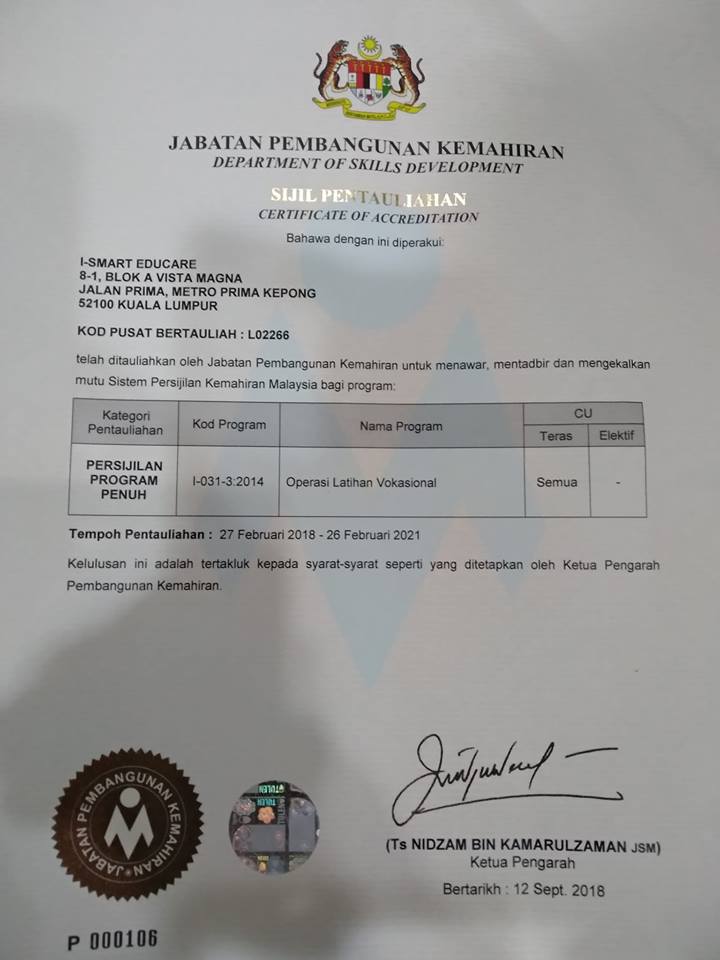
Sebelum tahun 2019, ada kes-kes tertentu di mana pentauliahan program secara bersyarat diberi, antaranya:
Ruj : JPK/702/1/10 JLD 14 (36)
Tarikh : 18 Disember 2018
Adalah dimaklumkan bahawa JPK telah mengkaji semula keputusan pemansuhan pelaksanaan kelulusan pentauliahan program secara bersyarat di bawah Sistem Persijilan Kemahiran Malaysia mulai 1 Januari 2019 yang telah dihebahkan melalui arahan pentadbiran (No. Rujukan : JPK/702/1/10 JLD 14 (18) bertarikh 30 Julai 2018.
Selaras dengan ini, Jabatan telah memutuskan supaya tiada lagi kelulusan pentauliahan program secara bersyarat akan dikeluarkan mulai 1 Januari 2019, kecuali untuk dua (2) keadaan berikut :
Sehubungan itu, selain dua keadaan di atas, Penyedia Latihan Kemahiran / Pusat Bertauliah hendaklah mematuhi semua kriteria pentauliahan program kerana tiada lagi kelulusan secara bersyarat akan diberikan selepas tarikh kuatkuasa.
Justeru, hebahan yang telah dikeluarkan melalui rujukan JPK/702/1/10 Jld. 14 (18) bertarikh 30 Julai 2018 adalah terbatal.
Sekian dimaklumkan. Terima kasih.
“BERKHIDMAT UNTUK NEGARA”
“Pekerja Berkemahiran Peneraju Kecemerlangan Negara”
Ketua Pengarah
Jabatan Pembangunan Kemahiran
Kementerian Sumber Manusia
Sumber: www.dsd.gov.my
Sekiranya anda masih ada sebarang persoalan mengenai pentauliahan program/pusat JPK anda, boleh dapatkan khidmat runding daripada min.

If you don’t understand BM well, can always email or call us for further explanation OR read the English version here.
如果您不太了解马来语,可以随时发送电子邮件或致电我们进一步了解详情
Sejak 2001, min berkecimpung dalam bidang latihan kemahiran ni (terutamanya yang berkaitan dengan JPK), macam-macam kes penipuan telah min jumpa/dengar.
Berikut adalah senarainya, tak terhad kepada ini sahaja (mungkin min lupa atau tak pernah dengar/jumpa tapi memang berlaku):
1. Sijil induksi PALSU – Sebelum ni, tahun 2000an, memang ada sesetengah penganjur yang hit & run, cetak sijil sendiri & JUAL kepada peserta (tak perlu ikuti kursus). Ia samalah seperti penjualan sijil/diploma/ijazah di universiti ataupun sijil cuti sakit. Namun, pihak Jabatan Pembangunan Kemahiran (JPK) telah mengambil langkah untuk membendung perkara ni dari berlanjutan dimana:
a) Penganjur tidak boleh cetak sijil sendiri lagi
b) Sijil telah ada ciri-ciri keselamatan (bukan setakat no siri sijil sahaja) – itu yang menyebabkan kekadang sijil dapat lambat sebab JPK kehabisan sijil & perlu tunggu stok dari Percetakan Nasional Malaysia
TIPS: Cari penganjur yang sudah lama (> 10 tahun kalau boleh) & kerap menganjur (lebih 6 kali setahun) kerana mereka tidak berani bertindak sebarangan & juga senantiasa mengikut perkembangan terkini. Ia juga mengurangkan kemungkinan penganjur menunda kursus induksi berkali-kali, ia berlaku terutamanya penganjur adalah baru dan tiada peserta berkumpulan besar.

2. Bukti PALSU – Ini kerap berlaku terutamanya dalam permohonan SKM secara PPT.
Ini mungkin salah sesetengah pemohon, ada yang sememangnya tahu dia tak layak tapi BAYAR perunding untuk kaodim, biasanya beribu-ribu.
Macam mana min tahu? Sebab ada kisah benar yang diceritakan oleh PPL-PPT (Pegawai Pengesah Luaran yang mengesahkan penilaian PP-PPT).
Cth: Ada seorang lelaki yang langsung tak pernah terlibat dengan kecantikan (cuma ada perniagaan dalam bidang ni) mewujudkan bukti palsu (gambar/invois/sijil) tapi telah digagalkan oleh PPL-PPT yang memegang amanah beliau. Apa yang menggeramkan min adalah dengar khabar setelah calon (melalui perunding) minta PPL-PPT ditukarkan, calon tu LULUS.
Geram betul, calon/perunding/PPL-PPT seperti nilah yang menjahanamkan kualiti SKM #^@*%

TIPS: Baca Panduan Permohonan SKM secara PPT @ ikuti kursus induksi PP-PPT – jadual disini supaya anda ada sedikit idea apa yang diperlukan dan sekiranya dah faham, mohon terus dengan JPK, cuma RM300/setahap.
Kebelakangan ni, ada perunding yang menjanjikan calon yang tiada pengalaman mengajar bidang kemahiran bahawa mereka layak mohon VTO secara PPT. Agak-agaknya buat bukti PALSU lagi kot. Ni juga kisah benar, dimana 2 juruteknik auto yang tidak pernah mengajar dijanjikan oleh perunding bahawa mereka boleh dapat VTO secara PPT!
Itu yang menyumbangkan kepada banyak isu pemegang sijil VTO yang tidak boleh mengajar dengan baik ataupun tak tahu sangat tentang WIM (bahan pengajaran bertulis). Min tak nafikan juga ada Pusat Bertauliah VTO tertentu yang bagi ‘lesen terbang’, sehinggakan ada beberapa PB VTO yang telah ditarik pentauliahannya dan menyebabkan permohonan PB VTO baru/penambahan program VTO ni dibekukan.
Untuk pengetahuan anda, pengalaman mengajar minima adalah 4 tahun kalau nak mohon VTO secara PPT. Dah banyak kes penipuan calon tak cukup pengalaman mengajar tapi dijanjikan tiada masalah untuk mohon dan dapat sijil VTO secara PPT.
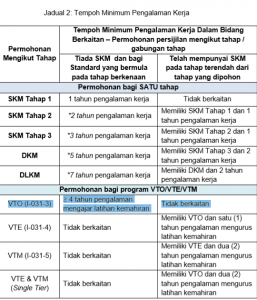
3. Penjualan WIM yang tidak menepati format ataupun jumlah jam yang sepatutnya.
Ha, ni berlaku bukan sahaja dalam dunia latihan kemahiran tapi syarikat gergasi MNC pun ada juga yang melakukan kesalahan sebegini.
Biasa lihat ni kan?
Sudah banyak PB/pembeli yang kantoi dengan janji-janji manis individu/perunding bahawa WIM yang mereka beli memenuhi spesifikasi/format JPK tetapi sebenarnya tidak.
Antara isu yang kerap timbul adalah:
1. Format (tidak mengikut format terkini)
2. Jumlah jam yang tidak menepati kehendak NOSS (sudah banyak kes untuk ni, terutamanya untuk program yang ada kes khas seperti FB-024-2 (1200j dan bukannya 800j)
3. Jadual Pembahagian WIM yang tidak menggunakan ayat yang betul ataupun setara dengan WIM yang dibangunkan
TIPS: Suruh penjual emelkan sampel WIM lengkap (ada Kertas Penerangan/Kerja/Tugasan, Pelan Mengajar Teori/Amali, Kertas Penilaian Pengetahuan (KA)/Prestasi (PA), lepas tu cross check dengan format WIM terikini (2017) dan juga NOSS.
Cukuplah setakat ni, kalau anda ada sebarang lagi kes penipuan/janji tidak serupa bikin yang nak dikongsi (tak kira pasal SKM, induksi, pentauliahan PB, WIM ke apa) supaya orang ramai lebih berhati-hati dan tidak tertipu,
sila emel ke ismarteducare@gmail.com, terima kasih.

Tips mencari perunding yang jujur (elak penipuan):
1. Dah lama berkecimpung dalam bidang latihan kemahiran (ni pun tak menjamin apa-apa)
2. Cuba dapatkan testimoni/pengesyoran dari 2-3 pihak, kalau ada.
3. Dapatkan pandangan/nasihat dari 2-3 individu/syarikat.
4. Sekiranya masih rasa was-was, sila rujuk dengan min atau lebih baik, JPK di 03-88865589.
* singkatan min bermaksud admin ya 😀
Semakan Status Pengeluaran Sijil Kemahiran Malaysia dan Diploma Kemahiran Malaysia telah dikemaskini, bukannya di https://www.skkm.gov.my/esijil/semak-status lagi tetapi di https://myspike.my/.
1. Sekiranya sijil hilang ke rosak, sila baca panduan yang boleh dimuat turun dari laman ini.
2. Tiada no/tarikh keahlian pada Sijil Kemahiran Malaysia
3. Jika minat sambung SKM3/DKM/DLKM ke Degree, sila semak sini
4. Kalau nak mohon SKM tahap lebih tinggi dengan pengalaman kerja anda, sila rujuk sini
5. Sekiranya anda belum/tidak ambil sijil dari Pusat Latihan anda seperti KV, ILP, IKBN, Giatmara, PB swasta, sila rujuk dengan Pusat Latihan anda. Kami tidak dapat membantu.
Tarikh: 12 November 2018
Assalamualaikum dan Salam Sejahtera.
YBhg. Prof./Dato’/Datin/Tuan/Puan,
PEMAKLUMAN SEMAKAN STATUS PERSIJILAN KEMAHIRAN MALAYSIA
Dimaklumkan PB/Pemohon bolehlah membuat semakan status permohonan persijilan SKM/DKM melalui link di bawah :
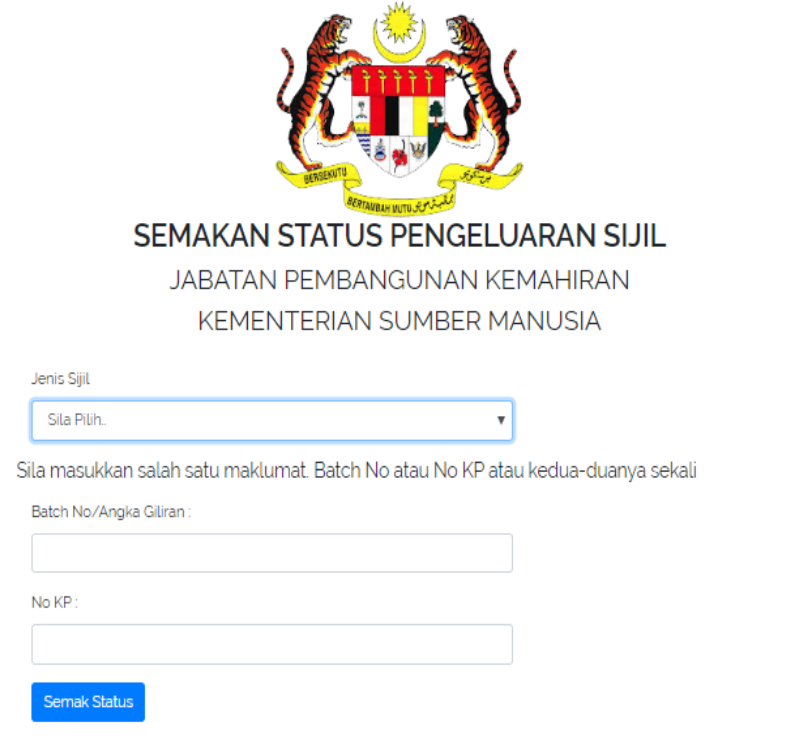
Salurkan segala aduan dan masalah melalui modul Aduan Pengguna MySPIKE. Untuk masalah emel dan katalaluan mohon emailkan kepada myspike@mohr.gov.my atau hubungi helpdesk di talian 03-88862468/2335/5516.
Kerjasama dari semua amatlah dihargai.
Sekian, terima kasih
Jabatan Pembangunan Kemahiran
Kementerian Sumber Manusia
NOTA:
1. Sekiranya sijil hilang ke rosak, sila baca panduan & muat turun borang dari sini.
2. Tiada no/tarikh keahlian pada Sijil Kemahiran Malaysia
3. Jika minat sambung SKM3/DKM/DLKM ke Degree, sila semak sini
4. Kalau nak mohon SKM tahap lebih tinggi dengan pengalaman kerja anda, sila rujuk sini